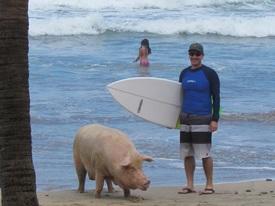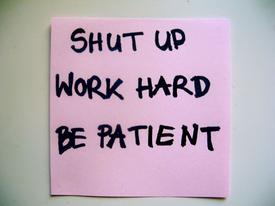Why I don't count exercise calories
Replies
-
I think this is great advice, especially for people who are pretty consistent with working out and such. And for people without the time to diligently log every exercise and calculate precise numbers for the day. I go on and off with exercising so I find its better to eat less on the days I don't, and eat more on the days I do, and adding in exercise calories and eating them back helps me keep track.
But I totally agree with you that reading this site can drive one up the wall and make losing weight seem SOOO complex, when it doesn't have to be.0 -
A friend and I started our weight loss at the same time using the same calorie counting method. 3 months later I'm ripped head to toe, as I eat all my calories back. My friend lost the same amount of weight, but now has a sagging mid section and excess skin. He did not eat back his calories.
respectfully, I'm thinking genetics has a lot to do with you being ripped and your friend not0 -
Azdak, I always enjoy your posts! Thanks!0
-
So you recommend every female to start eating a minimum of 1600 calories? I like the sound of that!0
-
I appreciate your post and the reasoning behind it. For me, since I'm fairly serious about my athletic training, it's good for me to track my workouts. Yes, the numbers may be off...but I know my body fairly well and know what should be a good estimate for me based on how hard I worked cardiovascularly and the number of muscle groups worked. I use the numbers here as a guess and often adjust a little down, since I'm in pretty good shape.
If I didn't log my exercise calories, I would eat the same on the days I train for 6 hours as on the days I only train for 2. That may work out in the long run, but for each day, I would be fueled so differently for my workouts it would be hard to make consistent progress cardiovascualrly or with strength training.
I agree that if all the counting seems too overwhelming, try the way you've suggested. But I feel like logging, even though not 100% accurate, may actually be slightly more accurate than your suggestion if your activity levels vary greatly from day to day.0 -
lol if that's you in your avatar, you probably didn't need to read it anyways. It pertains to those of us trying to lose weight.
Wow, what a B!TCH!0 -
I personally feel like I wouldn't have been successful If I didn't eat back some of my exercise cals and log it as a daily thing. Glad you found something that worked for you! Cheers!0
-
Thank you for these tips!0
-
I appreciate your post and the reasoning behind it. For me, since I'm fairly serious about my athletic training, it's good for me to track my workouts. Yes, the numbers may be off...but I know my body fairly well and know what should be a good estimate for me based on how hard I worked cardiovascularly and the number of muscle groups worked. I use the numbers here as a guess and often adjust a little down, since I'm in pretty good shape.
If I didn't log my exercise calories, I would eat the same on the days I train for 6 hours as on the days I only train for 2. That may work out in the long run, but for each day, I would be fueled so differently for my workouts it would be hard to make consistent progress cardiovascualrly or with strength training.
I agree that if all the counting seems too overwhelming, try the way you've suggested. But I feel like logging, even though not 100% accurate, may actually be slightly more accurate than your suggestion if your activity levels vary greatly from day to day.
Note that I mentioned that this was appropriate for beginners with high levels of body fat.0 -
So you recommend every female to start eating a minimum of 1600 calories? I like the sound of that!
If they are over 200 lbs, it's not a bad idea.0 -
I CAN'T eat back my exercise calories. I went to a registered dietician and had my RMR (resting metabolic rate) done with the breathing mask, et cetera. It was 1055 calories per day. Adding in a couple hundred for walking to the bathroom, et cetera, I get up to a whopping 1350 calories per day. To lose, I have to eat at least 1200 calories and still create a deficit as my dietician doesn't want me to go below 1200 calories a day consumed. That said, I try to exercise 300 to 500 calories for my weight loss. Ugh.0
-
Oh, I do definitely track everything, all exercise and everything eaten. I just don't generally eat back my exercise calories...0
-
Wow, what a B!TCH!
My thoughts exactly!0 -
I agree that there are many inconsistencies when calculating burned calories. In fact, it's all pretty confusing. There are posts all around the internet that scare you into thinking that your body will go into "starvation" mode if you don't consume enough calories to cover your basic needs, etc. However, myself, not being anywhere near a dietitian nor any sort of a fitness expert, easily give in. It's hard when you have so many contradictory articles to read when researching what might be the best approach to weight loss.
I do enjoy the calorie tracking, however. Both intake and expelled through exercise. Not because I feel as if they are absolutely correct, but because if I wasn't obsessing over hitting a certain range of numbers, I might just forget about doing it all together... which then leads to guilt, regret, and probably weight gain through careless eating and lack of substantial exercise. But that's just me. I lack discipline without tracking the numbers.0 -
What would you recommend for a woman that only needs to lose 8 more pounds?0
-
Wow, what a B!TCH!
as if posting in here saying that she didn't read it because it was too long wasn't *****y? pffft0 -
Note that I mentioned that this was appropriate for beginners with high levels of body fat.
Fair enough. I had thought you meant it was appropriate for everyone, but *especially* for beginners with high levels of body fat (ie, they might be overwhelmed by devoting so much time to logging/exercising/measuring/etc), but re-reading your post, I see your point.0 -
I just have to say that by logging anything and everything, I am held accountable to myself. I have been able to see things I thought I could not eat, that I can eat... and when I thought I was eating enough, I was not! I have not had blood sugar issues or dizzy spells so I know I am doing well and keeping my body fed and hydrated. If anything I am drinking more water and eating better!

To each their own. 0
0 -
as if posting in here saying that she didn't read it because it was too long wasn't *****y? pffft
Why does she have to be called outside her name? Lets be lady-like. I know your vocab is much broader. Anyways I don't think she was trying to be nasty. I think she was giving her a bit of a compliment because she looks pretty good in her avatar. Hence the "lol". Now if she hadn't used that then I would have to had to agree that she was. But ummmm the young lady didn't have to come in and comment the way she did because frankly who really cares if she didn't want to read the post. Thats what the back arrow is for. FIN.
***********************
To the OP I think you are a very insightful gentlemen and I always appreciate your post & blogs.0 -
I like the idea of simplifying calorie allowance. As this forum tells us, it's something that confuses many people.
I have in the past used weight loss plans where the exercise calories were counted in the daily activity level like the OP recommends. That worked fine for me when my exercise was basically the same - an hour gym or class on most days.
However, I knew something was awry when I GAINED weight training for a marathon. I didn't track calories in and out and basically took it as a licence to eat anything.
Now I've shaken up my exercise routine. Some days I may burn 150 doing some resistance training, others I may torch 1000+ hiking for three hours. I find my requirement for food alters accordingly - maybe I'm more in touch with my real hunger.
So for the time being, I'll stick with MFP's basic allowance and eat back all or most of my exercise calories on the day I burn them. It seems to be working!0 -
That's sad. Why would you post a reply then? Anyway, in response to the article, I think it's an interesting approach to weight-loss. Good point about it being stressful to eat only 1200 calories a day or tracking little things like doing house cleaning. I eat different calorie amounts each day depending on how I feel, what's going on, if I exercise, etc. . . I have eaten between 1200-2500 since I started loosing weight, different reasons for each day.0
-
Great info,
I am relatively new to the site and to trying to manage / understand my food intake vs exercise.
I a learning a lot every day.
For now I am sticking with the 1660 calories that MFP suggests and I will log anything that gets my respiration up and gives me a sweat. May not be accurate but to date it is motivational. As I progress to my goals and learn more this may change.
Thanks for posting your thoughts.0 -
One of the interesting things about posting anything in a public forum is the difference between what you INTENDED to communicate and what was PERCEIVED by the readers.
In this case, I think I tried to address too many issues at once and muddled my own message.
Many people came away with the impression (my fault) that I was saying that you should not track your exercise calories. They wrote how logging and tracking everything made them accountable, helped stay on track, etc. I tried to make the distinction between tracking/logging exercise calories and using those numbers in your eating plan and obviously did not do the job very well.
I was writing this primarily to two audiences--one is those who feel they NEED to do things like buy heart rate monitors, log activity calories like housework and account for every calorie expended in order to "eat them back". Again, I emphasize the idea that they feel they NEED to do these things because they are being told that's what they have to do. (If you are doing it because you WANT to, and have a plan worked out, that is fine--whatever you do).
The other (related) is those people who feel they NEED to do all of this because, if they don't, they will go into "starvation mode" because they will incur too great a calorie deficit. For those who are starting out and 40+% body fat (female, 30+% BF for males), that is not as big a concern. In my experience, if one stays in the 1500-1800 calorie/day range, refuels after long, strenuous workouts, one can sustain calorie deficits of greater than 1000 calories per day and see some better results without any fear of "starvation mode". (As weight loss occurs and body fat levels decrease that will no longer hold true, but in the beginning you should be fine).
I experienced this in my own program a couple of years ago, but have not mentioned it much because I don't think personal anecdotes are all that applicable. But then I saw the same thing happen with our weight loss program clients and felt it was a subject worth mentioning. We have had 140 people go through our program in 16 months. Avg wt loss in 12 wks is a little over 20 pounds. It is a behavioral approach only--no drugs or supplements of any kind. Clients have multiple visits with a psychologist, dietitian, and personal trainer. Knowing the ages and backgrounds of the participants, I know that NONE of them has ever logged or eaten back a single exercise calorie.
So, it's just an alternative way of looking at things for those who might find it helpful. I thank everyone for taking time to read the post and for your comments and feedback.0 -
When you are extremely over weight, you can't tell if you are losing any muscle mass as you starve away fat. You are talking about a 1000 calorie per day deficit with no regard for protein intake, healthy fats, or carb intake. You will lose WEIGHT, but not necessarily FAT. If you are not monitoring your protein intake, you will lose muscle mass.
If you are only concerned with the scale, then calories OUT > calories IN, will do the job. However, if you want to PROPERLY lose FAT and look absolutely fantastic when you reach your goal, then you must track your activity, you must workout, and you must eat the right foods at the right times.
Your approach is good for beginners, but I encourage anyone serious about weight loss to look into as much info as possible.
Anecdote: When I lost my body fat, I followed your approach... I picked a number under 2000 calories and stuck with it for about 6 weeks, then I realized that I was losing strength in my legs. My deficit did not account for such a high burn, as a result I lost muscle mass. I corrected the problem and continued to rip up at an extraordinary rate.
To each his/her own, but I warn that your approach (as you mentioned) cannot be sustained. You will need to look into alternative approaches as your body reaches an equilibrium and your weight loss plateaus.0 -
One of the interesting things about posting anything in a public forum is the difference between what you INTENDED to communicate and what was PERCEIVED by the readers.
In this case, I think I tried to address too many issues at once and muddled my own message.
...
So, it's just an alternative way of looking at things for those who might find it helpful. I thank everyone for taking time to read the post and for your comments and feedback.
Thanks for replying to us, too! I really enjoyed your post and took away some interesting new information and perspective. I'll look forward to reading more from you in the future!0 -
Ok so what you are saying is basically this: We should set our Calories to at least 1,500 and not less then 1,300??
And in doing this it will help to shed pounds along with exercising? I only want to lose about 60 pounds an I love this
site but its difficult figuring out how many Calories we "Need" to eat etc in order to lose weight in a healthy way. I would
prefer to lose at least 1.5 pounds a week rather then losing as slow as I am now. I keep changing my numbers because
of things i read saying we "Need" this % of Carbs, Protein & Fat etc etc and it does become over welming, All I want to do is
lose the weight and keep it off. I Eat,Exercise and logg everything. And the ZigZag effect doesn't work for me like others do
and it seems to work for them.
Thanks for the info0 -
Completely honest here, no I did not read the 3 pages of responses. So sorry if anything I say is repetitive or out of left field. :glasses:
I just wanted to give my story, and how it seems to back up what Azdak is saying...
I used to weigh 191 pounds and I was wearing size 20 (US clothes size). I went from that start weight to 128 pounds and a US size 6 in about a year's time (February 2007 to March 2008). During that particular time, I didn't know about MFP (or even if it was around back then?) and I had never heard of "eating back exercise calories" or even trying to calculate exercise calories. I simply used those nifty equations to determine that my TDEE was around 2000 calories or so, and that current research said that eating about 75% of your TDEE level calories was healthy for weight loss. Therefore, I consistently ate about 1500 calories daily. I also did home workouts Power 90, Turbo Jam, and then P90X as my fitness improved. At the time, I had no freakin' idea how many calories I was burning off, nor did I care. I ate healthy foods in generous enough portions so I wasn't starving (like those people who eat only 1000 calories...I'd go nuts in 3 days eating that little) but I was steadily losing weight.
I gained weight after reaching 128 pounds because I didn't know how to maintain my loss. It was suggested to me to eat more and exercise less...but the exact math behind that wasn't really given to me, so bingo, I got myself back up to 150 pounds. At that point, I found this website. That was late last year. I started studying how things were done on this website (cause let's face it, it takes a lot of studying to figure out all these weird-o calculations for BMR, exercise cals, eating exercise cals, etc, etc). This website calculates me as needing around 1200 calories per day plus eating exercise calories. So on non-exercise days, I starve myself eating only 1200, and then I have to put blind faith and trust in either MFP's calculation of exercise calories or an HRM... All in all, doing things the MFP way gave me increased stress and quite slow weight loss and hardly any fat loss (weight and fat loss are different, yet confused by many people).
About 2 months ago, I stopped using MFP for their calculations of my metabolism and perceived exercise calories. I went back to basics...back to what I knew worked for me and I knew would work again. I started eating a max of 1600 calories per day and changed my goals manually to reflect this. Of course, MFP argued that I would then lose only 0.1 pound per week. Interesting how I've lost nearly 10 pounds so far, huh? I haven't used my HRM since April. I haven't even began to think about how many calories I've burned off. Because I knew that my diet was spot on for my body, I was exercising consistently, and the clothes showed it...as well as the scale.
I've mentioned this very thing before in other posts here, and I am scoffed at regularly in private messages or even on the message boards for not "eating back exercise calories" or even calculating them at all. But I am quite healthy, I am steadily losing body fat, and I have less stress because all I have to do is plan my meals ahead of time and make sure I eat them and workout.
Counting every last little thing like exercise calories may be important for some people. But I would very much agree with anyone who says that it is not completely necessary for success. :flowerforyou:0 -
bump0
-
bump0
-
bump!0
This discussion has been closed.
Categories
- All Categories
- 1.4M Health, Wellness and Goals
- 395.7K Introduce Yourself
- 44.1K Getting Started
- 260.7K Health and Weight Loss
- 176.3K Food and Nutrition
- 47.5K Recipes
- 232.8K Fitness and Exercise
- 448 Sleep, Mindfulness and Overall Wellness
- 6.5K Goal: Maintaining Weight
- 8.6K Goal: Gaining Weight and Body Building
- 153.2K Motivation and Support
- 8.2K Challenges
- 1.3K Debate Club
- 96.4K Chit-Chat
- 2.5K Fun and Games
- 4.3K MyFitnessPal Information
- 16 News and Announcements
- 17 MyFitnessPal Academy
- 1.4K Feature Suggestions and Ideas
- 3K MyFitnessPal Tech Support Questions





















